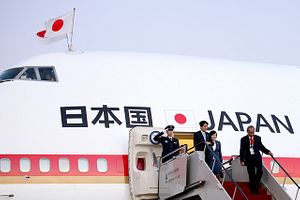Relations between Japan and the Korean Peninsula have improved in recent weeks, particularly with South Korea, even as talks with North Korea over the issue of its abducted citizens have stalled. While the government of Prime Minister Shinzo Abe has been keen to rebuild relationships with the region’s other leaders, it appears that the Japanese public is now warming to the idea of improving ties as well. A thaw in tensions with South Korea has been particularly slow since President Park Geun-hye took office in February 2013; however, multiple bilateral meetings through a variety of channels show that while the prospect of bringing the relationship back to where it was before Abe became premier may not be secure, the possibility of a bilateral meeting between the two leaders at the upcoming APEC summit in Beijing is becoming increasingly so.
After a summer of increasing cooperation between Japan and North Korea over the investigation into Japanese citizens abducted during the 1980s and 70s, Pyongyang’s failure to produce an initial report is beginning to sour the goodwill earned after Japan reduced some of its sanctions in early July. After a meeting of officials in the Chinese city of Shenyang on Monday, in which North Korea offered to allow Japanese officials to visit Pyongyang and meet members of the investigative committee, it is unclear how Abe’s government plans to proceed, although sources that spoke with the Jiji Press said it would make a decision by the end of the week. However, the head of the Association of the Families of Victims Kidnapped by North Korea told the government officials in charge of the abduction issue “Most of the families agreed that it would be ineffective for (the officials) to visit North Korea just to meet members of the special investigation committee.”
North Korea’s ambassador to the U.N., So Se-pyong, told Reuters on Thursday that while he did not know if Japanese officials would take Pyongyang up on its offer, he said North Korea was ready to solve the problem in a frank manner. However, he did make a rather surprising revelation. While North Korea does not generally acknowledge more than the 12 abducted citizens about whom the Japanese government is officially seeking information, So said he did not know how many abductees there are. “Whether it is a hundred, or 200 or 500, I don’t know exactly. We don’t know the exact numbers, those are very difficult problems there.” While some Japanese groups allege there could be more than 800 abductees, it is unusual for North Korea to hint at such high numbers. Whether this is an indication as to why the initial report has been delayed or just a simple slip by So is unclear at this point. It could perhaps be an attempt to further entice Japanese officials to accept Pyongyang’s offer of a visit.
Negotiations between Tokyo and Seoul have been steadier, although they have not created the same level of expectation as those with the reclusive Kim regime. However, the Japanese public has warmed to the idea of a public summit between Abe and Park. A poll conducted by Nikkei and TV Tokyo last weekend found that those who supported a meeting with Seoul “in the near future” was 46 percent, up 7 points from a poll taken the previous month. The Nikkei further speculated that the improvement was due to people’s perception that the damaged relationship was beginning to be repaired.
In support of that assumption, several rounds of bilateral talks were either arranged or held this week. On Tuesday a group of Japanese and South Korean lawmakers agreed to hold a meeting in Seoul later this month to discuss historical issues such as “comfort women.” Former Chief Cabinet Secretary Takeo Kawamura told the Yomiuri Shimbun that the Japanese delegation “should not avoid discussions on sensitive issues.” Meanwhile, on Wednesday the two countries held their first “strategic talks” between vice foreign ministers since January 2013, before Park came into office. Though the specifics of their meeting were vague, beyond a hope to “deepen bilateral communication,” their first meeting since both Abe and Park came to power is worth noting. Finally, on Wednesday South Korea’s Vice Foreign Minister Cho Tae-yong told Japanese Foreign Minister Fumio Kishida that despite their difficult issues, “we hope to make next year the year the relationship will start to develop.” This came after both foreign ministers met on the sidelines of the U.N. General Assembly meeting last week.
While the atmosphere between Japan and South Korea has been improving of late, Seoul remains hesitant to commit to a bilateral summit, much as China has. Cho’s statement about making next year a sort of “reset” is vague, yet it could include a meeting at the APEC summit as a sort of taking off point for that relationship. Seoul could also be concerned about not being included in the overall improvement in cooperation between Japan and North Korea in recent months. Whatever Seoul’s reasoning, Tokyo’s attempts to normalize its relationships with both countries have made some progress, uneven though it may be.

































